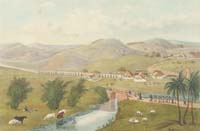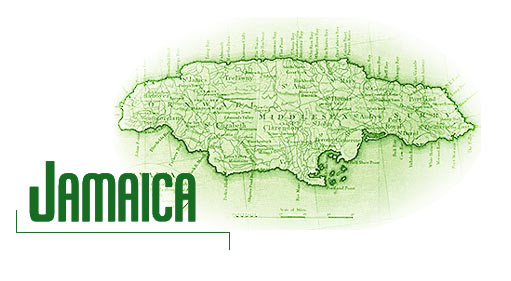
Jamaica's history before emancipation had
been influenced mainly by the British colonization of the island. The
British colonized
the island in order to turn it into a sugar colony.
In the process of doing so sugar and the slave
trade brought great wealth to many whites who were eager to make a fortune
at the expense of the enslaved Africans. Life for the slaves
was an absolute nightmare. But with the announcement of emancipation,
life soon became easier. Many families moved off the plantations and
built houses o f
their own. Villages sprang up all over the island. While the ex-slaves
were rising up and bettering themselves the plantation owners were losing
money and many plantations eventually folded.
Many churches were built and so were several schools. Their religions
can be seen as a trait which seperates the
people of Jamaica and the island itself from any other
society past or present. Many young men and women attended the local
schools and some would become teachers. Thus while the British colonization
did harm to many blacks it also shaped them
as a unique people. No more did blacks have to work eighteen-hour days.
With the new forty-one hour work week many families spent more time
together and became closer. f
their own. Villages sprang up all over the island. While the ex-slaves
were rising up and bettering themselves the plantation owners were losing
money and many plantations eventually folded.
Many churches were built and so were several schools. Their religions
can be seen as a trait which seperates the
people of Jamaica and the island itself from any other
society past or present. Many young men and women attended the local
schools and some would become teachers. Thus while the British colonization
did harm to many blacks it also shaped them
as a unique people. No more did blacks have to work eighteen-hour days.
With the new forty-one hour work week many families spent more time
together and became closer.
The emancipation proclamation was read on August
1, 1834.
From that that day forth labor opportunities and experiences changed
for the better. But there was a huge problem that confronted
the slaves after emancipation. Mandatory apprenticeship was now a new
obstacle for them. They had to serve an apprenticeship of four years—a
turn from slave labor into a more tolerable wage labor. But the planters
abused the new system and failed to keep the many promises they had
made to obey the new laws. Because of the behavior of the plantation
owners, apprenticeship was abolished after only three years.
While many ex-slaves did well others were left in dire poverty,
often starving and naked in some villages on the island. Their elected
governemt was supposed to be representing
them and looking out for their well being, yet the whites on the island
were almost exclusively the ones who could vote. Many tried to
contact the Queen, they were promptly told that it was not the government’s
fault but rather the laziness of the people that led to their poverty.
The people were fed up with the conditions, which was almost as bad
as it had been during slavery and only a small incident was needed to
lead to an outburst of violence. Thus in 1865, after two years of severe
drought that worsened the blacks already miserable conditions, the masses
reached their boiling point in the small town of Morant
Bay. A man unjustly imprisoned for trespassing on a long abandoned plantation.
Many came from a small village nearby and broke him out leading to the
order of more arrests. Within days a large mob returned to massacre
the justices , and thus the Morant
Bay Rebellion broke out. A large portion of the plantations on the eastern
half of the island would be destroyed and many whites were killed. Yet
the government repercussions were far more severe, with hundreds of
blacks rounded up and executed. The people of Britain were outraged by the actions of their
own government in Jamaica and public sentiment finally turned
in favor of the masses of poor blacks. The incident in Morant Bay turned out to be one of the defining
points in Jamaica's struggle for both political and
economical enhancement.
|

